外研版(2019)必修 第三册Unit 2 Making a difference Developing ideas-Writing a biography课件(共24张PPT)
文档属性
| 名称 | 外研版(2019)必修 第三册Unit 2 Making a difference Developing ideas-Writing a biography课件(共24张PPT) | 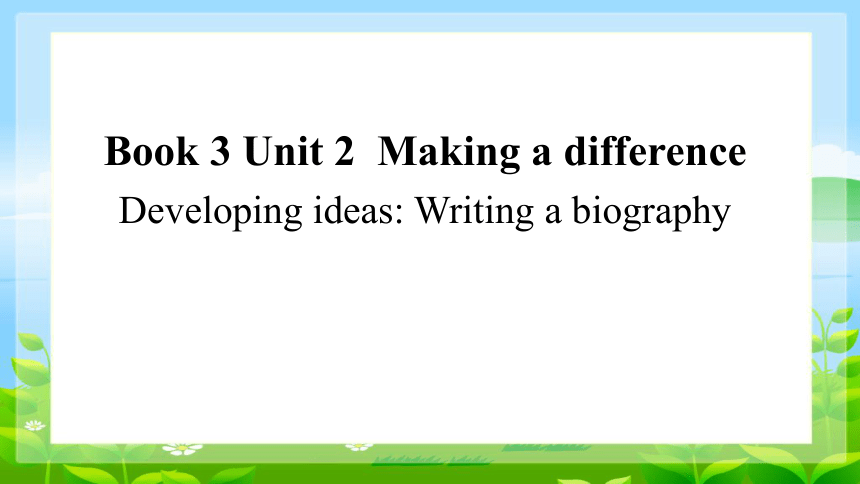 | |
| 格式 | pptx | ||
| 文件大小 | 9.7MB | ||
| 资源类型 | 教案 | ||
| 版本资源 | 外研版(2019) | ||
| 科目 | 英语 | ||
| 更新时间 | 2025-05-12 16:42:32 | ||
图片预览

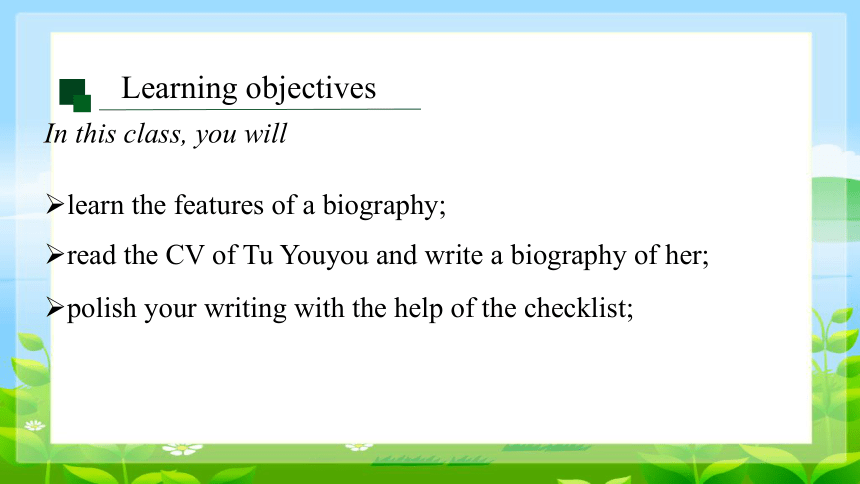
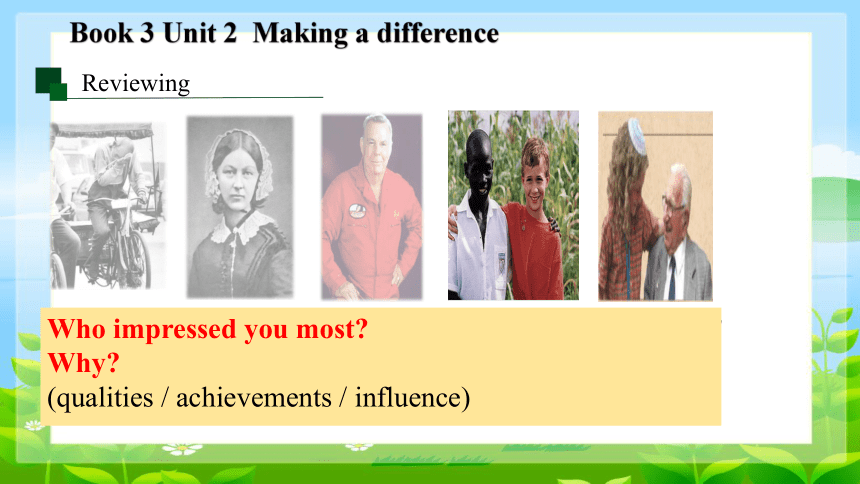

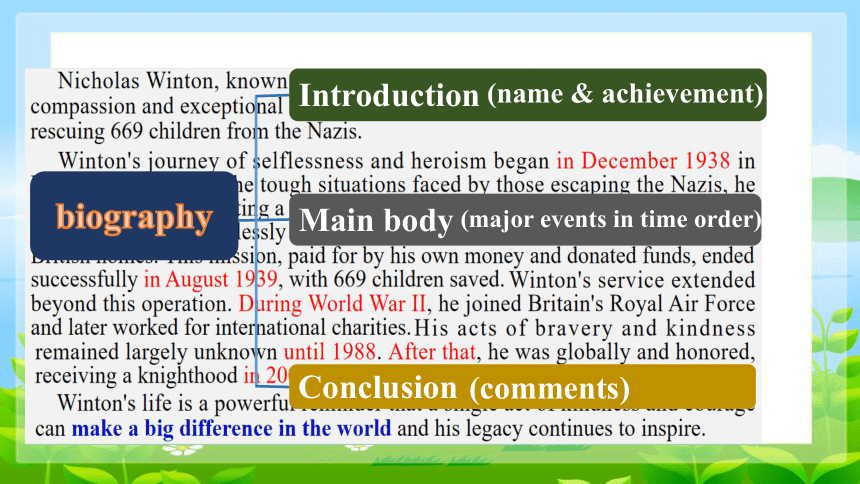
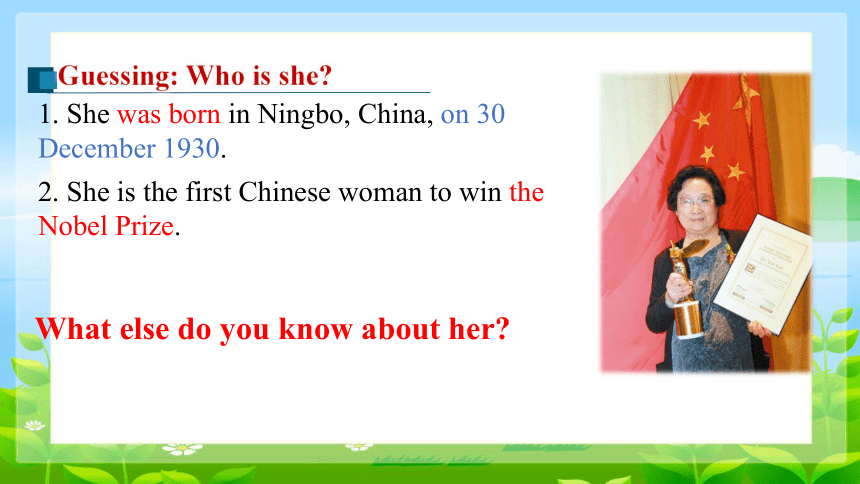

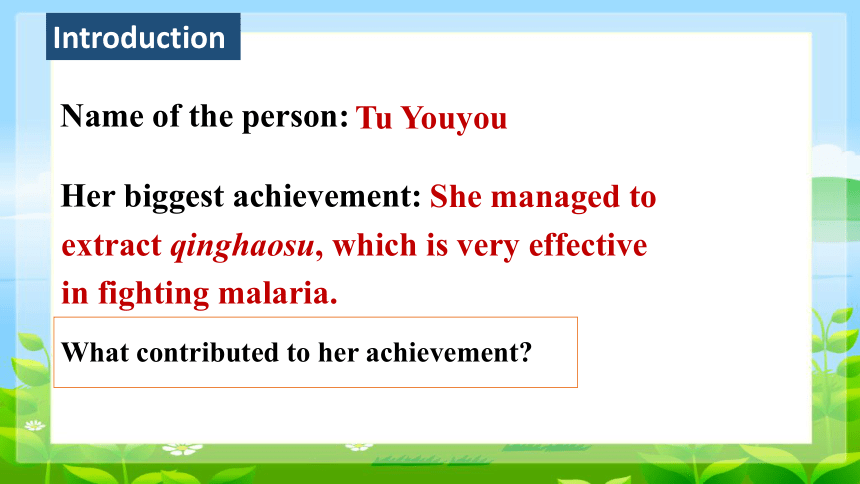
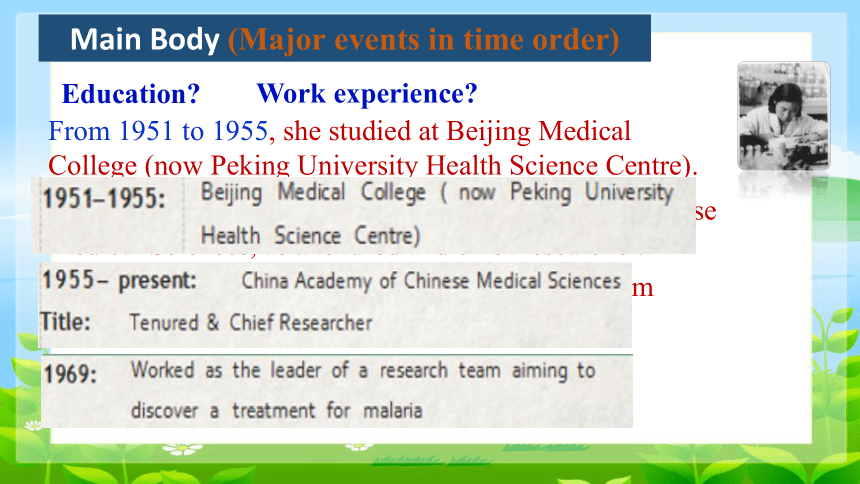
文档简介
(共24张PPT)
Book 3 Unit 2 Making a difference
Developing ideas: Writing a biography
Learning objectives
In this class, you will
learn the features of a biography;
read the CV of Tu Youyou and write a biography of her;
polish your writing with the help of the checklist;
Reviewing
Book 3 Unit 2 Making a difference
Bai Fangli
charitable
generous
Florence Nightingale
caring
considerate
Red Adair
brave
devoted
Ryan
sympathetic
determined
Nicholas Winton
compassionate
courageous
...
Who impressed you most
Why
(qualities / achievements / influence)
Give a talk in honor of Nicholas Winton
Nicholas Winton, the "British Schindler," was a man of immense compassion and exceptional courage. His life-changing actions in 1939 saved 669 children from the Nazis.
Winton's journey of selflessness and heroism began in December 1938 in Prague. Seeing the tough situations faced by those escaping the Nazis, he was driven to help, starting a rescue mission for the children.
In the following months, he worked tirelessly to ensure their safety and found them British homes. This mission, ended successfully in August 1939, with 669 children saved.
Winton's service extended beyond this operation. During World War II, he joined Britain's Royal Air Force and later worked for international charities.
His acts of bravery and kindness remained largely unknown until 1988. After that, he was globally honored, receiving a knighthood in 2003, and the Order of the White Lion in 2014.
Winton's life is a powerful reminder that a single act of kindness and courage can make a big difference in the world and his legacy continues to inspire.
Main body
biography
Introduction
Conclusion
(major events in time order)
(name & achievement)
(comments)
Guessing: Who is she
1. She was born in Ningbo, China, on 30 December 1930.
2. She is the first Chinese woman to win the Nobel Prize.
What else do you know about her
Read Tu Youyou’s CV and fill in the boxes with complete sentences (P30-31).
Introduction
Name of the person:
Her biggest achievement:
Tu Youyou
She managed to extract qinghaosu, which is very effective in fighting malaria.
What contributed to her achievement
Main Body (Major events in time order)
From 1951 to 1955, she studied at Beijing Medical College (now Peking University Health Science Centre).
Since 1955, she has worked at China Academy of Chinese Medical Sciences, as a tenured and chief researcher.
In 1969, she worked as the leader of a research team aiming to discover a treatment for malaria.
Education
Work experience
In 1972, she managed to extract qinghaosu from a Chinese herb, which is very effective in fighting malaria.
In 1986, she obtained a New Drug Certificate for qinghaosu, issued by the Ministry of Health of China.
In 2015, she won the Nobel Prize in Physiology or Medicine for discovering a novel therapy against malaria.
In 2019, she was nominated for “The Greatest Person of the 20th Century”.
Main Body (Major events in time order)
a woman of great achievement
Conclusion
Your opinion on her contribution:
1. She saved many people suffering from malaria.
2. She has proved the effectiveness of Chinese herbs.
3. Her devotion to medical research makes her a truly inspiring and influential figure.
What are the influences of her achievements
What qualities lead to her achievements
Discussion
Is this a well-written biography
Tu Youyou managed to extract qinghaosu, which is effective in fighting malaria.
From 1951 to 1955, she studied at Beijing Medical College (now Peking University Health Science Centre). Since 1955, she has worked at China Academy of Chinese Medical Sciences, as a tenured and chief researcher. In 1969, she worked as the leader of a research team aiming to discover a treatment for malaria. In 1972, she managed to extract qinghaosu from a Chinese herb, which is very effective in fighting malaria. In 1986, she obtained a New Drug Certificate for qinghaosu, issued by the Ministry of Health of China. In 2015, she won the Nobel Prize in Physiology or Medicine for discovering a novel therapy against malaria. In 2019, she was nominated for “The Greatest Person of the 20th Century”.
She saved many people suffering from malaria. She has proved the effectiveness of Chinese herbs. Her devotion to medical research makes her a truly inspiring and influential figure.
Group discussion:
What are the problems
How to improve it
Write a biography of Tu Youyou.
Refer to the checklist while writing and reviewing.
□ Is it organized in the right order
Writing & Self-/Peer-reviewing
□ Are the important details (i.e. basic personal information, education, work experience, achievements, qualities, influence) fully covered
□ Is the language logical & coherent
□ Is the tone formal for a biography
□ Are the sentences well-constructed and varied in structure
Introduction
Tu Youyou managed to extract qinghaosu, which is effective in fighting malaria.
From 1951 to 1955, she studied at Beijing Medical College (now Peking University Health Science Centre). Since 1955, she has worked at China Academy of Chinese Medical Sciences, as a tenured and chief researcher. In 1969, she worked as the leader of a research team aiming to discover a treatment for malaria. In 1972, she managed to extract qinghaosu from a Chinese herb, which is very effective in fighting malaria. In 1986, she obtained a New Drug Certificate for qinghaosu, issued by the Ministry of Health of China. In 2015, she won the Nobel Prize in Physiology or Medicine for discovering a novel therapy against malaria. In 2019, she was nominated for “The Greatest Person of the 20th Century”.
She saved many people suffering from malaria. She has proved the effectiveness of Chinese herbs. Her devotion to medical research makes her a truly inspiring and influential figure.
Introduction (name & achievement)
eye-catching
In 2015, for the first time, a Chinese scientist won the Nobel Prize in Physiology or Medicine for her groundbreaking achievements in malaria treatment. She is Tu Youyou.
Body
In 2015, for the first time, a Chinese scientist won the Nobel Prize in Physiology or Medicine. She is Tu Youyou.
From 1951 to 1955, she studied at Beijing Medical College (now Peking University Health Science Centre). Since 1955, she has worked at China Academy of Chinese Medical Sciences, as a tenured and chief researcher. In 1969, she worked as the leader of a research team aiming to discover a treatment for malaria. In 1972, she managed to extract qinghaosu from a Chinese herb, which is very effective in fighting malaria. In 1986, she obtained a New Drug Certificate for qinghaosu, issued by the Ministry of Health of China. In 2015, she won the Nobel Prize in Physiology or Medicine for discovering a novel therapy against malaria. In 2019, she was nominated for “The Greatest Person of the 20th Century”.
She saved many people suffering from malaria. She has proved the effectiveness of Chinese herbs. Her devotion to medical research makes her a truly inspiring and influential figure.
Main body (major events in time order )
logical & coherent & varied
In 2015, for the first time, a Chinese scientist won the Nobel Prize in Physiology or Medicine. She is Tu Youyou.
From 1951 to 1955, she studied at Beijing Medical College (now Peking University Health Science Centre). Since 1955, she has worked at China Academy of Chinese Medical Sciences, as a tenured and chief researcher. In 1969, she worked as the leader of a research team aiming to discover a treatment for malaria. In 1972, she managed to extract qinghaosu from a Chinese herb, which is very effective in fighting malaria. In 1986, she obtained a New Drug Certificate for qinghaosu, issued by the Ministry of Health of China. In 2015, she won the Nobel Prize in Physiology or Medicine for discovering a novel therapy against malaria. In 2019, she was nominated for “The Greatest Person of the 20th Century”.
She saved many people suffering from malaria. She has proved the effectiveness of Chinese herbs. Her devotion to medical research makes her a truly inspiring and influential figure.
Main body (major events in time order )
logical & coherent & varied
Born in Ningbo, Zhejiang Province on 30 December 1930, Tu Youyou pursued higher education at Beijing Medical College (now Peking University Health Science Centre) from 1951 to 1955. Since then, she has worked at China Academy of Chinese Medical Sciences as a tenured chief researcher. 1969 saw her working as the leader of a research team aiming to discover a treatment for malaria.
In 2015, for the first time, a Chinese scientist won the Nobel Prize in Physiology or Medicine. She is Tu Youyou.
Born in Ningbo, Zhejiang Province on 30 December 1930, Tu Youyou pursued higher education at Beijing Medical College (now Peking University Health Science Centre) from 1951 to 1955. Since then, she has worked at China Academy of Chinese Medical Sciences as a tenured chief researcher. 1969 saw her working as the leader of a research team aiming to discover a treatment for malaria. In 1972, she managed to extract qinghaosu from a Chinese herb, which is very effective in fighting malaria. In 1986, she obtained a New Drug Certificate for qinghaosu, issued by the Ministry of Health of China. In 2015, she won the Nobel Prize in Physiology or Medicine for discovering a novel therapy against malaria. In 2019, she was nominated for “The Greatest Person of the 20th Century”.
She saved many people suffering from malaria. She has proved the effectiveness of Chinese herbs. Her devotion to medical research makes her a truly inspiring and influential figure.
Main body (major events in time order )
logical & coherent & varied
By 1972, she had managed to extract qinghaosu from a Chinese herb, which is very effective in fighting malaria. Fourteen years later, she obtained a New Drug Certificate for qinghaosu, issued by the Ministry of Health of China.
In 2015, for the first time, a Chinese scientist won the Nobel Prize in Physiology or Medicine. She is Tu Youyou.
Born in Ningbo, Zhejiang Province on 30 December 1930, Tu Youyou pursued higher education at Beijing Medical College (now Peking University Health Science Centre) from 1951 to 1955. Since then, she has worked at China Academy of Chinese Medical Sciences as a tenured chief researcher. 1969 saw her working as the leader of a research team aiming to discover a treatment for malaria. By 1972, she had managed to extract qinghaosu from a Chinese herb, which is very effective in fighting malaria. Fourteen years later, she obtained a New Drug Certificate for qinghaosu, issued by the Ministry of Health of China. In 2015, she won the Nobel Prize in Physiology or Medicine for discovering a novel therapy against malaria. In 2019, she was nominated for “The Greatest Person of the 20th Century”.
She saved many people suffering from malaria. She has proved the effectiveness of Chinese herbs. Her devotion to medical research makes her a truly inspiring and influential figure.
Main body (major events in time order )
logical & coherent & varied
Because of her great contribution, she was presented with the Nobel Prize at the age of 85. In addtion to this, she was nominated for “The Greatest Person of the 20th Century” in 2019, further enhancing her impact.
In 2015, for the first time, a Chinese scientist won the Nobel Prize in Physiology or Medicine. She is Tu Youyou.
Born in Ningbo, Zhejiang Province on 30 December 1930, Tu Youyou pursued higher education at Beijing Medical College (now Peking University Health Science Centre) from 1951 to 1955. Since then, she has worked at China Academy of Chinese Medical Sciences as a tenured chief researcher. A significant milestone in her career was reached in 1969 when she worked as the leader of a research team aiming to discover a treatment for malaria. By 1972, she had managed to extract qinghaosu from a Chinese herb, which is very effective in fighting malaria. Fourteen years later, she obtained a New Drug Certificate for qinghaosu, issued by the Ministry of Health of China. Because of her great contribution, she was presented with the Nobel Prize at the age of 85. In addtion to this, she was nominated for “The Greatest Person of the 20th Century” in 2019, further enhancing her impact.
She saved many people suffering from malaria. She has proved the effectiveness of Chinese herbs. Her devotion to medical research makes her a truly inspiring and influential figure.
Not only has she saved many people suffering from malaria, but also she has proved the effectiveness of Chinese herbs.
Conclusion
Conclusion (conclusive comments)
logical & coherent & varied
It is her lifelong devotion to medical research that makes her a truly inspiring and influential figure.
In 2015, for the first time, a Chinese scientist won the Nobel Prize in Physiology or Medicine. She is Tu Youyou.
Born in Ningbo, Zhejiang Province on 30 December 1930, Tu Youyou pursued higher education at Beijing Medical College (now Peking University Health Science Centre) from 1951 to 1955. Since then, she has worked at China Academy of Chinese Medical Sciences as a tenured chief researcher. 1969 saw her working as the leader of a research team aiming to discover a treatment for malaria. By 1972, she had managed to extract qinghaosu from a Chinese herb, which is very effective in fighting malaria. Fourteen years later, she obtained a New Drug Certificate for qinghaosu, issued by the Ministry of Health of China. Because of her great contribution, she was presented with the Nobel Prize at the age of 85. In addtion to this, she was nominated for “The Greatest Person of the 20th Century” in 2019, further enhancing her impact.
Not only has she saved many people suffering from malaria, but also she has proved the effectiveness of Chinese herbs. It is her lifelong devotion to medical research that makes her a truly inspiring and influential figure.
Biography
Polish your writing.
First, read an article about Tu Youyou and draw a mindmap following the structure of a biography. Then compare your writing with the reading material and polish your writing following the checklist.
Homework
Surf the Internet/Interview him/her.
Complete the form about the person on page 32.
Write an outline, according to what you have learned today.
Homework
Recommend someone as “Person of the Year”.
Reflection
biography
Conclusion (comments)
(conclusive)
Introduction (name & achievement)
(eye-catching)
Main body (major events in time order)
(logical & coherent)
Thank you!
Book 3 Unit 2 Making a difference
Developing ideas: Writing a biography
Learning objectives
In this class, you will
learn the features of a biography;
read the CV of Tu Youyou and write a biography of her;
polish your writing with the help of the checklist;
Reviewing
Book 3 Unit 2 Making a difference
Bai Fangli
charitable
generous
Florence Nightingale
caring
considerate
Red Adair
brave
devoted
Ryan
sympathetic
determined
Nicholas Winton
compassionate
courageous
...
Who impressed you most
Why
(qualities / achievements / influence)
Give a talk in honor of Nicholas Winton
Nicholas Winton, the "British Schindler," was a man of immense compassion and exceptional courage. His life-changing actions in 1939 saved 669 children from the Nazis.
Winton's journey of selflessness and heroism began in December 1938 in Prague. Seeing the tough situations faced by those escaping the Nazis, he was driven to help, starting a rescue mission for the children.
In the following months, he worked tirelessly to ensure their safety and found them British homes. This mission, ended successfully in August 1939, with 669 children saved.
Winton's service extended beyond this operation. During World War II, he joined Britain's Royal Air Force and later worked for international charities.
His acts of bravery and kindness remained largely unknown until 1988. After that, he was globally honored, receiving a knighthood in 2003, and the Order of the White Lion in 2014.
Winton's life is a powerful reminder that a single act of kindness and courage can make a big difference in the world and his legacy continues to inspire.
Main body
biography
Introduction
Conclusion
(major events in time order)
(name & achievement)
(comments)
Guessing: Who is she
1. She was born in Ningbo, China, on 30 December 1930.
2. She is the first Chinese woman to win the Nobel Prize.
What else do you know about her
Read Tu Youyou’s CV and fill in the boxes with complete sentences (P30-31).
Introduction
Name of the person:
Her biggest achievement:
Tu Youyou
She managed to extract qinghaosu, which is very effective in fighting malaria.
What contributed to her achievement
Main Body (Major events in time order)
From 1951 to 1955, she studied at Beijing Medical College (now Peking University Health Science Centre).
Since 1955, she has worked at China Academy of Chinese Medical Sciences, as a tenured and chief researcher.
In 1969, she worked as the leader of a research team aiming to discover a treatment for malaria.
Education
Work experience
In 1972, she managed to extract qinghaosu from a Chinese herb, which is very effective in fighting malaria.
In 1986, she obtained a New Drug Certificate for qinghaosu, issued by the Ministry of Health of China.
In 2015, she won the Nobel Prize in Physiology or Medicine for discovering a novel therapy against malaria.
In 2019, she was nominated for “The Greatest Person of the 20th Century”.
Main Body (Major events in time order)
a woman of great achievement
Conclusion
Your opinion on her contribution:
1. She saved many people suffering from malaria.
2. She has proved the effectiveness of Chinese herbs.
3. Her devotion to medical research makes her a truly inspiring and influential figure.
What are the influences of her achievements
What qualities lead to her achievements
Discussion
Is this a well-written biography
Tu Youyou managed to extract qinghaosu, which is effective in fighting malaria.
From 1951 to 1955, she studied at Beijing Medical College (now Peking University Health Science Centre). Since 1955, she has worked at China Academy of Chinese Medical Sciences, as a tenured and chief researcher. In 1969, she worked as the leader of a research team aiming to discover a treatment for malaria. In 1972, she managed to extract qinghaosu from a Chinese herb, which is very effective in fighting malaria. In 1986, she obtained a New Drug Certificate for qinghaosu, issued by the Ministry of Health of China. In 2015, she won the Nobel Prize in Physiology or Medicine for discovering a novel therapy against malaria. In 2019, she was nominated for “The Greatest Person of the 20th Century”.
She saved many people suffering from malaria. She has proved the effectiveness of Chinese herbs. Her devotion to medical research makes her a truly inspiring and influential figure.
Group discussion:
What are the problems
How to improve it
Write a biography of Tu Youyou.
Refer to the checklist while writing and reviewing.
□ Is it organized in the right order
Writing & Self-/Peer-reviewing
□ Are the important details (i.e. basic personal information, education, work experience, achievements, qualities, influence) fully covered
□ Is the language logical & coherent
□ Is the tone formal for a biography
□ Are the sentences well-constructed and varied in structure
Introduction
Tu Youyou managed to extract qinghaosu, which is effective in fighting malaria.
From 1951 to 1955, she studied at Beijing Medical College (now Peking University Health Science Centre). Since 1955, she has worked at China Academy of Chinese Medical Sciences, as a tenured and chief researcher. In 1969, she worked as the leader of a research team aiming to discover a treatment for malaria. In 1972, she managed to extract qinghaosu from a Chinese herb, which is very effective in fighting malaria. In 1986, she obtained a New Drug Certificate for qinghaosu, issued by the Ministry of Health of China. In 2015, she won the Nobel Prize in Physiology or Medicine for discovering a novel therapy against malaria. In 2019, she was nominated for “The Greatest Person of the 20th Century”.
She saved many people suffering from malaria. She has proved the effectiveness of Chinese herbs. Her devotion to medical research makes her a truly inspiring and influential figure.
Introduction (name & achievement)
eye-catching
In 2015, for the first time, a Chinese scientist won the Nobel Prize in Physiology or Medicine for her groundbreaking achievements in malaria treatment. She is Tu Youyou.
Body
In 2015, for the first time, a Chinese scientist won the Nobel Prize in Physiology or Medicine. She is Tu Youyou.
From 1951 to 1955, she studied at Beijing Medical College (now Peking University Health Science Centre). Since 1955, she has worked at China Academy of Chinese Medical Sciences, as a tenured and chief researcher. In 1969, she worked as the leader of a research team aiming to discover a treatment for malaria. In 1972, she managed to extract qinghaosu from a Chinese herb, which is very effective in fighting malaria. In 1986, she obtained a New Drug Certificate for qinghaosu, issued by the Ministry of Health of China. In 2015, she won the Nobel Prize in Physiology or Medicine for discovering a novel therapy against malaria. In 2019, she was nominated for “The Greatest Person of the 20th Century”.
She saved many people suffering from malaria. She has proved the effectiveness of Chinese herbs. Her devotion to medical research makes her a truly inspiring and influential figure.
Main body (major events in time order )
logical & coherent & varied
In 2015, for the first time, a Chinese scientist won the Nobel Prize in Physiology or Medicine. She is Tu Youyou.
From 1951 to 1955, she studied at Beijing Medical College (now Peking University Health Science Centre). Since 1955, she has worked at China Academy of Chinese Medical Sciences, as a tenured and chief researcher. In 1969, she worked as the leader of a research team aiming to discover a treatment for malaria. In 1972, she managed to extract qinghaosu from a Chinese herb, which is very effective in fighting malaria. In 1986, she obtained a New Drug Certificate for qinghaosu, issued by the Ministry of Health of China. In 2015, she won the Nobel Prize in Physiology or Medicine for discovering a novel therapy against malaria. In 2019, she was nominated for “The Greatest Person of the 20th Century”.
She saved many people suffering from malaria. She has proved the effectiveness of Chinese herbs. Her devotion to medical research makes her a truly inspiring and influential figure.
Main body (major events in time order )
logical & coherent & varied
Born in Ningbo, Zhejiang Province on 30 December 1930, Tu Youyou pursued higher education at Beijing Medical College (now Peking University Health Science Centre) from 1951 to 1955. Since then, she has worked at China Academy of Chinese Medical Sciences as a tenured chief researcher. 1969 saw her working as the leader of a research team aiming to discover a treatment for malaria.
In 2015, for the first time, a Chinese scientist won the Nobel Prize in Physiology or Medicine. She is Tu Youyou.
Born in Ningbo, Zhejiang Province on 30 December 1930, Tu Youyou pursued higher education at Beijing Medical College (now Peking University Health Science Centre) from 1951 to 1955. Since then, she has worked at China Academy of Chinese Medical Sciences as a tenured chief researcher. 1969 saw her working as the leader of a research team aiming to discover a treatment for malaria. In 1972, she managed to extract qinghaosu from a Chinese herb, which is very effective in fighting malaria. In 1986, she obtained a New Drug Certificate for qinghaosu, issued by the Ministry of Health of China. In 2015, she won the Nobel Prize in Physiology or Medicine for discovering a novel therapy against malaria. In 2019, she was nominated for “The Greatest Person of the 20th Century”.
She saved many people suffering from malaria. She has proved the effectiveness of Chinese herbs. Her devotion to medical research makes her a truly inspiring and influential figure.
Main body (major events in time order )
logical & coherent & varied
By 1972, she had managed to extract qinghaosu from a Chinese herb, which is very effective in fighting malaria. Fourteen years later, she obtained a New Drug Certificate for qinghaosu, issued by the Ministry of Health of China.
In 2015, for the first time, a Chinese scientist won the Nobel Prize in Physiology or Medicine. She is Tu Youyou.
Born in Ningbo, Zhejiang Province on 30 December 1930, Tu Youyou pursued higher education at Beijing Medical College (now Peking University Health Science Centre) from 1951 to 1955. Since then, she has worked at China Academy of Chinese Medical Sciences as a tenured chief researcher. 1969 saw her working as the leader of a research team aiming to discover a treatment for malaria. By 1972, she had managed to extract qinghaosu from a Chinese herb, which is very effective in fighting malaria. Fourteen years later, she obtained a New Drug Certificate for qinghaosu, issued by the Ministry of Health of China. In 2015, she won the Nobel Prize in Physiology or Medicine for discovering a novel therapy against malaria. In 2019, she was nominated for “The Greatest Person of the 20th Century”.
She saved many people suffering from malaria. She has proved the effectiveness of Chinese herbs. Her devotion to medical research makes her a truly inspiring and influential figure.
Main body (major events in time order )
logical & coherent & varied
Because of her great contribution, she was presented with the Nobel Prize at the age of 85. In addtion to this, she was nominated for “The Greatest Person of the 20th Century” in 2019, further enhancing her impact.
In 2015, for the first time, a Chinese scientist won the Nobel Prize in Physiology or Medicine. She is Tu Youyou.
Born in Ningbo, Zhejiang Province on 30 December 1930, Tu Youyou pursued higher education at Beijing Medical College (now Peking University Health Science Centre) from 1951 to 1955. Since then, she has worked at China Academy of Chinese Medical Sciences as a tenured chief researcher. A significant milestone in her career was reached in 1969 when she worked as the leader of a research team aiming to discover a treatment for malaria. By 1972, she had managed to extract qinghaosu from a Chinese herb, which is very effective in fighting malaria. Fourteen years later, she obtained a New Drug Certificate for qinghaosu, issued by the Ministry of Health of China. Because of her great contribution, she was presented with the Nobel Prize at the age of 85. In addtion to this, she was nominated for “The Greatest Person of the 20th Century” in 2019, further enhancing her impact.
She saved many people suffering from malaria. She has proved the effectiveness of Chinese herbs. Her devotion to medical research makes her a truly inspiring and influential figure.
Not only has she saved many people suffering from malaria, but also she has proved the effectiveness of Chinese herbs.
Conclusion
Conclusion (conclusive comments)
logical & coherent & varied
It is her lifelong devotion to medical research that makes her a truly inspiring and influential figure.
In 2015, for the first time, a Chinese scientist won the Nobel Prize in Physiology or Medicine. She is Tu Youyou.
Born in Ningbo, Zhejiang Province on 30 December 1930, Tu Youyou pursued higher education at Beijing Medical College (now Peking University Health Science Centre) from 1951 to 1955. Since then, she has worked at China Academy of Chinese Medical Sciences as a tenured chief researcher. 1969 saw her working as the leader of a research team aiming to discover a treatment for malaria. By 1972, she had managed to extract qinghaosu from a Chinese herb, which is very effective in fighting malaria. Fourteen years later, she obtained a New Drug Certificate for qinghaosu, issued by the Ministry of Health of China. Because of her great contribution, she was presented with the Nobel Prize at the age of 85. In addtion to this, she was nominated for “The Greatest Person of the 20th Century” in 2019, further enhancing her impact.
Not only has she saved many people suffering from malaria, but also she has proved the effectiveness of Chinese herbs. It is her lifelong devotion to medical research that makes her a truly inspiring and influential figure.
Biography
Polish your writing.
First, read an article about Tu Youyou and draw a mindmap following the structure of a biography. Then compare your writing with the reading material and polish your writing following the checklist.
Homework
Surf the Internet/Interview him/her.
Complete the form about the person on page 32.
Write an outline, according to what you have learned today.
Homework
Recommend someone as “Person of the Year”.
Reflection
biography
Conclusion (comments)
(conclusive)
Introduction (name & achievement)
(eye-catching)
Main body (major events in time order)
(logical & coherent)
Thank you!
